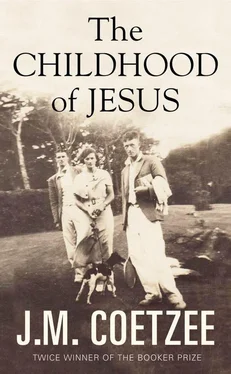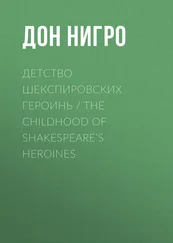The birthday celebration is overshadowed by a letter that comes in the post, reminding him that as of his sixth birthday David should be enrolled in the public school system, the responsibility for so enrolling him resting with his parent(s) or guardian(s).
Up to now Inés has encouraged the boy to believe that he is too clever to need schooling, that what little tutoring he may require he can receive at home. But his wilfulness over Don Quixote , his claims to be able to read and write and count when he clearly cannot, have sown doubt even in her mind. Perhaps it would be best, she now concedes, for him to have the guidance of a trained teacher. So they buy him a third, joint gift, a red leather pouch with the initial letter D stamped in gold in one corner, containing two new pencils, a pencil sharpener, and an eraser. This they present to him, along with the abacus and the sweater, on his birthday. The pouch, they tell him, is his surprise gift, to accompany the happy and surprising news that he will soon, perhaps as early as next week, be going to school.
The boy receives the news coolly. ‘I don’t want to go with Fidel,’ he says. They reassure him: being older than he, Fidel is bound to be in a different class. ‘And I want to take Don Quixote with me,’ he says.
He tries to dissuade the boy from taking the book to school. It belongs to the East Blocks library, he says; if it were to be lost he has no idea how they would replace it. Besides, the school is bound to have its own library with its own copy of the book. But the boy will have none of that.
On Monday he arrives early at the apartment to accompany Inés and the boy to the stop where he will catch the bus that will take him to his first day of school. The boy wears his new sweater, carries the red leather pouch with the initial D on it, and grips the tattered East Blocks Don Quixote under his arm. Fidel is already at the bus stop, along with half a dozen other children from the Blocks. Ostentatiously David does not greet him.
Because they want going to school to seem part of a normal life, they agree not to press the boy for tales of the classroom; and he, for his part, remains tight-lipped, unusually so. ‘Did it go well at school today?’ he dares to ask, on the fifth day. — ‘Uh-huh,’ replies the boy. — ‘Have you made new friends yet?’ The boy does not deign to reply.
Thus it continues for three weeks, four weeks. Then a letter arrives in the mail, with the school’s address in the top left-hand corner. Headed ‘Extraordinary Communication’, it invites the parent(s) of the pupil in question to contact the school secretary at his/her/their earliest convenience to fix a time for a consultation with the relevant class teacher in order to address certain issues that have arisen relating to his/her/their son/daughter.
Inés telephones the school. ‘I am free all day,’ she says. ‘Name a time and I will be there.’ The secretary proposes eleven o’clock the next morning, during señor León’s free period. ‘It will be best if the boy’s father comes too,’ she adds. ‘My son does not have a father,’ Inés replies. ‘I will ask his uncle to come along. His uncle takes an interest in him.’
Señor León, the first-year class teacher, turns out to be a tall, thin young man with a dark beard and only one eye. The dead eye, made of glass, does not move in its socket; he, Simón, wonders whether the children do not find this disturbing.
‘We have only a little time,’ says señor León, ‘therefore I will speak directly. I find David to be an intelligent boy, very intelligent. He has a quick mind; he grasps new ideas at once. However, he is finding it difficult to adjust to the realities of the classroom. He expects to get his own way all the time. Perhaps this is because he is a little older than the class average. Or perhaps at home he has been used to getting his own way rather too easily. In any event, it is not a positive development.’
Señor León pauses, places the fingers of one hand against the fingers of the other, tip to tip, and waits for their response.
‘A child should be free,’ says Inés. ‘A child should be able to enjoy his childhood. I had my doubts about sending David to school so young.’
‘Six is not young to be going to school,’ says señor León. ‘On the contrary.’
‘Nevertheless he is young, and used to his freedom.’
‘A child does not give up his freedom by coming to school,’ says señor León. ‘He does not give up his freedom by sitting still. He does not give up his freedom by listening to what the teacher has to say. Freedom is not incompatible with discipline and hard work.’
‘Does David not sit still? Does he not listen to what you say?’
‘He is restless, and he makes the other children restless too. He leaves his seat and roams around. He leaves the room without permission. And no, he does not pay attention to what I say.’
‘That is strange. At home he does not roam around. If he roams around at school, there must be a reason for it.’
The solitary eye bores into Inés.
‘As for the restlessness,’ she says, ‘he has always been like that. He doesn’t get enough sleep.’
‘A bland diet will cure that,’ says señor León. ‘No spices. No stimulants. I come now to specifics. In reading, David has unhappily made no progress, none at all. Other children who are not as naturally gifted read better than he does. Much better. There is something about the activity of reading that he seems unable to grasp. The same goes for figures.’
He, Simón, intervenes. ‘But he has a love for books. You must have seen that. He carries Don Quixote with him wherever he goes.’
‘He clings to the book because it has pictures,’ replies señor León. ‘It is generally not good practice to learn to read from books with pictures. The pictures distract the mind from the words. And Don Quixote , whatever else may be said about it, is not a book for beginning readers. David’s spoken Spanish is not bad, but he cannot read. He cannot even sound the letters of the alphabet. I have never come across such an extreme case. I would like to propose that we call in a specialist, a therapist. I have a feeling — and colleagues of mine whom I have consulted share my feeling — that there may be a deficit.’
‘A deficit?’
‘A specific deficit linked to symbolic activities. To working with words and numbers. He cannot read. He cannot write. He cannot count.’
‘At home he reads and writes. He spends hours at it every day. He is absorbed in his reading and writing. And he can count to a thousand, a million.’
For the first time señor León smiles. ‘He can recite all kinds of numbers, yes, but not in the right order. As for the marks he makes with his pencil, you may call them writing, he may call them writing, but they are not writing as generally understood. Whether they have some private meaning I cannot judge. Perhaps they have. Perhaps they hint at artistic talent. Which would be a second and more positive reason for him to see a specialist. David is an interesting child. It would be a pity to lose him. A specialist may be able to tell us whether there is some common factor underlying the deficit on the one hand and the inventiveness on the other.’
The bell rings. Señor León takes a notebook from his pocket, scribbles in it, tears off the page. ‘This is the name of the specialist I propose, and her telephone number. She visits the school once a week, so you can see her here. Telephone and make an appointment. In the meantime, David and I will continue with our efforts. Thank you for coming to see me. I am sure there will be a fortunate outcome.’
He seeks out Elena, reports on the interview. ‘Do you know señor León at all?’ he asks. ‘Did Fidel have him as a teacher? I find his complaints hard to credit. That David is disobedient, for instance. He may sometimes be a bit wilful, but not disobedient, not in my experience.’
Читать дальше












